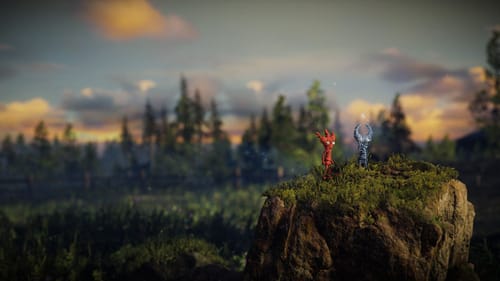Stay in the Loop
BSR publishes on a weekly schedule, with an email newsletter every Wednesday and Thursday morning. There’s no paywall, and subscribing is always free.
Gaming in quarantine
In the pandemic, these video games keep us connected to life—and each other

When physical-distancing measures to contain the COVID-19 pandemic first went into effect, I, like so many others, immediately sought comfort. For me, that meant Nintendo’s The Legend of Zelda: Breath of the Wild. When the world contracted, I roamed the open fields and mountains of Hyrule. Cueing up this action-adventure game, filled with sword battles and epic quests, gave me a sense of agency in a moment of profound uncertainty.
According to Verizon, the amount of time people in the US spent playing video games increased by 75 percent during the first weeks of the pandemic. Sony, the manufacturer of the PlayStation console system, has even had to reduce the speed of digital downloads to free up internet bandwidth.
By design, video games create worlds that are rule-bound and yet flexible, so it makes sense that they would be popular during a pandemic that has overturned everything stable. If you’ve spent any time on social media in the last few weeks, you’ve probably heard from someone who’s playing Animal Crossing: New Horizons. Vox calls it the perfect game for our present moment. In Animal Crossing, you control a cartoon avatar who lives in a neighborhood of talking animals, and you earn money to buy and sell goods. Apparently, we all crave the simulation of an ordinary routine.
Depending on you
Video games are an interactive art form, which means they depend upon our input, whether that’s pressing a button, rotating a joystick, or, as in Rock Band, singing into a microphone. The ubiquity of violence in video games is one consequence of this prerogative to act. Yet by making causality central to gameplay, video games can also inspire us to examine our decision-making processes and to reflect on what it might mean to live ethically and responsibly.
In The Last of Us, a zombie apocalypse game, you play as a no-nonsense man who must escort a young woman across the blighted landscape of the US. As you travel together, your bond develops and you eventually come to care for one another as father and daughter. Near the end of the game, you’re forced to make a decision with awful consequences. The game does not give you the illusion of choice; instead, it sheds light on the ramifications, both large and small, of a single decision. At a time when we’re forced to confront the scalability of our actions, video games can help to model that confrontation.

Critical thinking
Alongside decision-making, video-gamers also practice complex problem-solving. Many different video game genres incorporate some form of puzzle mechanic. In The Witness, for example, the player must navigate an island filled with puzzles. As you travel deeper into the game and traverse the island, the puzzles develop in complexity and ingenuity. As the title suggests, the game challenges the player to consider the nature of individual perspective and knowledge. According to the designer, he wanted to “make games for people who read Gravity’s Rainbow.” The game inspires us to consider the value of critical thinking during a time of insurmountable challenges.
Our current moment is also a time to question productivity. Video games, unsurprisingly, allow us to slow down and to reclaim time from the endless cycle of production and consumption. Games like Animal Crossing and Stardew Valley, a farming simulator, allow us to turn inward and carve out time well-spent from the grind of capitalism’s empty time.
Capacity for empathy
In the last decade, a new genre of video games has emerged. By prioritizing character and plot, they lift up video games as an art form. In games like Gone Home and Firewatch, there are rarely decisions to make or puzzles to solve. Because these games eschew the traditional conventions of video games (especially competition and violence), they were originally dismissed as “walking simulators” by toxic gatekeepers. However, the term has since caught on.
In walking simulators, gameplay often centers on exploration and self-discovery. These games are bursting with details that contribute to characterization and story development, and much of gameplay is occupied with reading letters or observing a forest from a lookout station. When we are absorbed in such reflective moments of individualized discovery, we are cultivating our capacity for empathy. By immersing ourselves in the details of other people’s lives, we learn to share their unique perspectives and value the diversity of human experience.

Trusting each other
Many of us are experiencing the profound loneliness of isolation during the pandemic, but video games demonstrate the extent of the trust we can place in one another. There are hundreds of cooperative video games where players work together to accomplish tasks. Games like Unravel Two and Portal 2 have cooperative modes where players work in tandem to solve puzzles. For families with children, these cooperative games can be valuable opportunities to develop skills like communication and teamwork.
The critically acclaimed Journey transforms cooperation into an existential priority. In the game, the player moves through a deserted landscape, filled with the ruins of a forgotten civilization. During your journey, you meet other players to whom you are connected via the Internet. You cannot speak to the other players; however, you find ways to wordlessly collaborate as you progress through the game. Journey is about connection and trust. We often know so little about others—even those closest to us. Yet we put our trust in one another, and that trust is the basis of our shared social world.
Why video games?
For those unfamiliar with the gaming realm, it can be hard to understand why so many people find enjoyment or relief in video games. Especially when contrasted with our present state of emergency, video games seem like nothing more than escapism. But it’s important to remember that we not only escape from but also to—to experiences of pleasure, to memories that bring us comfort, to new forms of solidarity, and to hope for a better world. So what can video games teach us during a pandemic? Nothing less than what it means to live—and play—alongside one another.
Sign up for our newsletter
All of the week's new articles, all in one place. Sign up for the free weekly BSR newsletters, and don't miss a conversation.

 Matthew John Phillips
Matthew John Phillips